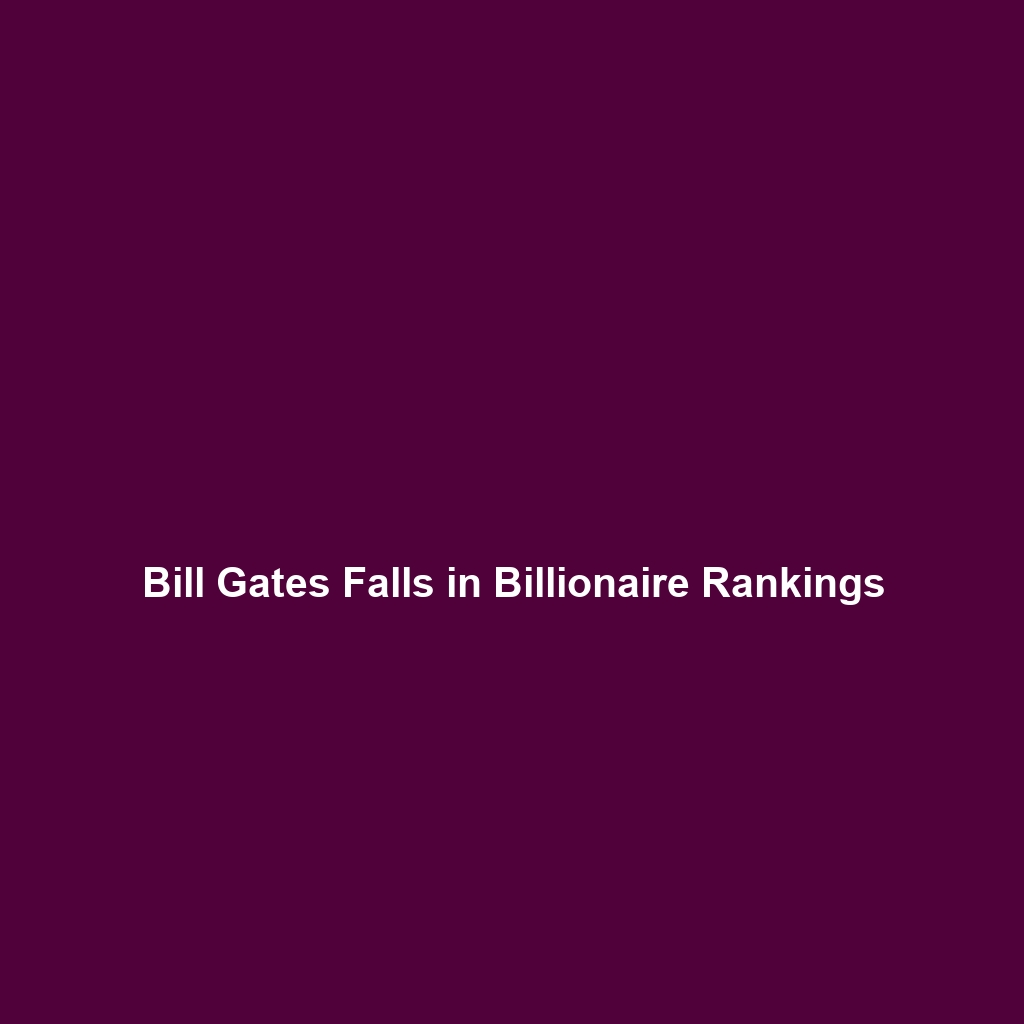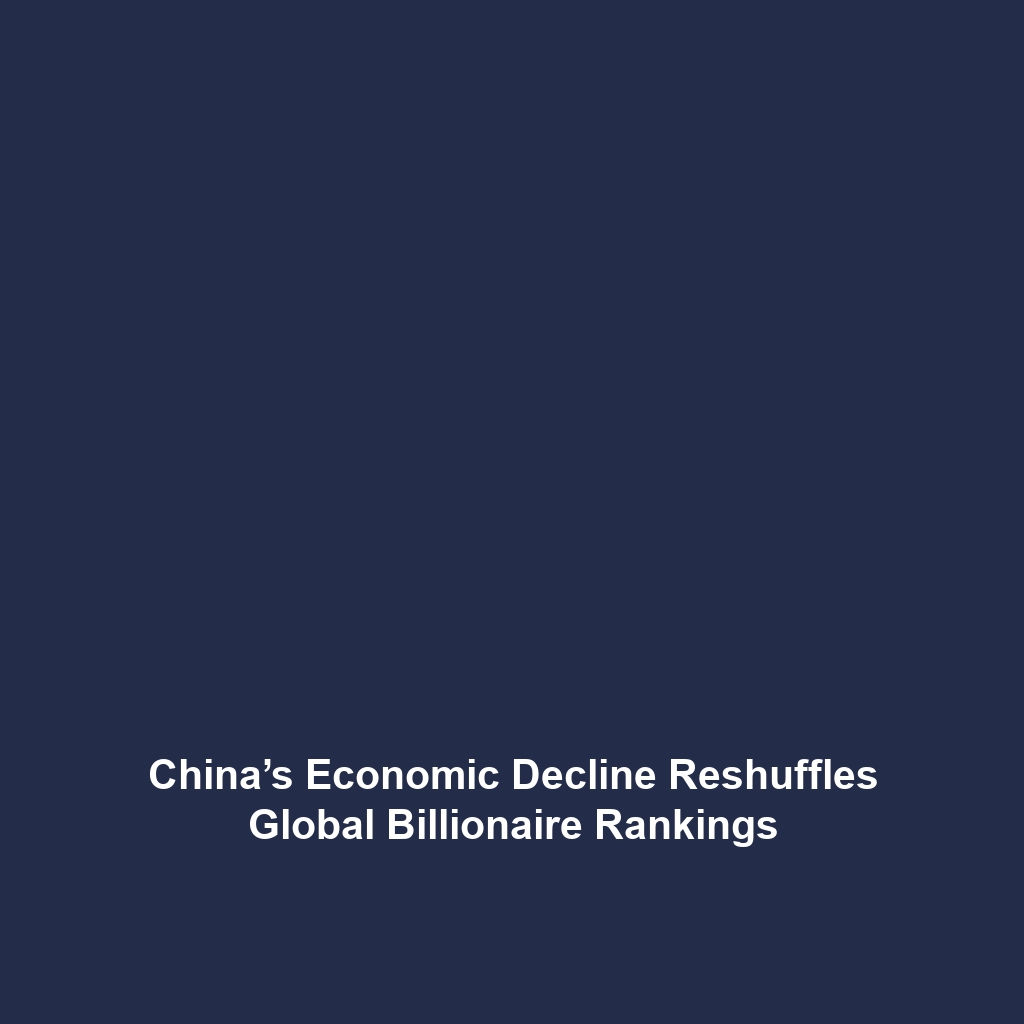Your cart is currently empty!
Tag: Bloomberg Billionaires Index

Bill Gates Falls in Billionaire Rankings
Bill Gates Falls in Billionaire Rankings
Bill Gates Falls in Billionaire Rankings
In a recent update to the Bloomberg Billionaires Index, Bill Gates has dropped to sixth place as the world’s richest person, a position he has not held since 2017. This change comes amidst a period of rapid technological advancements, particularly within artificial intelligence (AI), which has seen Gates’s wealth diminish relative to competitors in the tech sector, notably Elon Musk and others capitalizing on the AI revolution.
Gates’s Wealth Shift
Bill Gates, co-founder of Microsoft, has witnessed a significant shift in his financial standing. As of early October 2023, Gates’s net worth is estimated at $114 billion, a stark contrast to the approximately $126 billion held by Elon Musk, who has reclaimed the top position in billionaire rankings. The surge in tech stocks, particularly those linked to AI innovations, has propelled competitors ahead of Gates, pushing him down the list.
The emergence of AI as a growth sector has transformed the dynamics of wealth in technology. Companies like OpenAI, founded by Elon Musk and Sam Altman, and others such as Google and Amazon have experienced exponential growth due to their investments in AI technology. This acceleration has left Gates, who has shifted focus to philanthropic efforts through the Bill and Melinda Gates Foundation, at a disadvantage in the competitive landscape of tech billionaires.
The Tech Landscape Shift
The rapid advancements in AI technology are not only reshaping how businesses operate but also influencing the financial trajectories of key figures in the sector. With generative AI gaining popularity, firms specializing in such technologies have seen their valuations soar. Musk’s ventures, including Tesla and SpaceX, have benefited tremendously from this trend. According to an analysis by Forbes, Tesla’s stock price increased by more than 50% over the past six months, attributing much of that growth to the company’s foray into AI-driven applications.
In contrast, Microsoft, under Gates’s original stewardship, has seen fluctuations in its stock price, particularly after announcing layoffs and restructuring within its own divisions. The tech giant has engaged in AI development but faces stiff competition in this newly dynamic field. Experts suggest that Gates’s approach toward AI has not resonated as strongly as those of his competitors, leaving him at a crossroads regarding whether to return to a more direct involvement in tech.
Billionaire Rankings and Economic Indicators
The billionaire rankings serve not only as a measure of personal wealth but also as an indicator of broader economic trends within the tech sector. This recent shift highlights a transformative moment in technology, where innovation drives extreme wealth accumulation with unprecedented speed. A report by PwC indicates that the tech sector’s growth is not likely to slow down anytime soon, particularly in AI and machine learning, reinforcing the need for legacy companies, such as Microsoft, to adapt more rapidly to maintain their competitive edge.
According to Dr. Ayesha Khanna, co-founder of the advisory firm Addo AI, “The future of technology management is not just about software, but about leveraging the latest advancements in AI to solve modern challenges. Companies and individuals who adapt to this shift will thrive.” For Gates, being outside of the top tier of billionaire rankings could signify a need to reassess his current tech engagements and perhaps reconsider a more active role in emerging tech trends.
Philanthropy: A Different Focus
While Gates’s financial decline may be noted in billionaire rankings, it masks his significant influence in philanthropy and public health. The Bill and Melinda Gates Foundation, which focuses on global health issues and poverty alleviation, has contributed billions towards vaccine distribution and education reform, particularly post-pandemic. Gates’s commitment to philanthropy represents a strategic detachment from the fast-paced world of tech competition, which might be at odds with his philanthropic mission.
Gates himself has remarked on the importance of prioritizing global well-being over personal wealth accumulation. In a recent interview, he stated, “Wealth isn’t everything; the impact you create matters more.” This perspective raises questions about whether he will continue to see declines in his financial ranking, or if a renewed focus on technological engagement might drive him back up the list.
Conclusion: The Road Ahead for Gates
The shift in billionaire rankings is reflective of current economic realities defined by technological advancement and innovation. For Bill Gates, the drop to sixth place highlights the rapid pace of change and the intense competition within the technology sector, particularly from AI-driven companies. As he navigates the intersection of philanthropy and technology, it remains to be seen whether Gates will recalibrate his strategy to adapt to the shifting landscape of wealth and influence.
Continued surveillance of the tech sector will be crucial, as the companies associated with AI continue to dominate both headlines and wealth rankings. Gates’s past experience and current endeavors position him to possibly reclaim his stature, but significant shifts in strategy and engagement will be essential to meet the challenges posed by emerging competitors.

China’s Economic Decline Reshuffles Global Billionaire Rankings
China’s Economic Decline Reshuffles Global Billionaire Rankings
China’s Economic Decline Reshuffles Global Billionaire Rankings
China’s ongoing economic downturn has had profound implications on the global wealth landscape, most notably resulting in the removal of 155 billionaires from the prestigious list of the world’s wealthiest individuals. The ripple effects of this recession extend beyond financial losses for these high-net-worth individuals, reshaping the distribution of wealth across the globe.
Understanding the Economic Context
In recent years, rapid economic growth in China has significantly contributed to the emergence of a new class of billionaires. According to Forbes, the nation was home to approximately 1,200 billionaires, a figure that has been sharply reduced by the recession affecting various sectors, including real estate and manufacturing.
The decline in economic performance can be attributed to multiple factors, including stringent COVID-19 policies, a debt crisis within the property sector, and declining consumer confidence. The Chinese government’s decision to adjust its economic policies, aimed at promoting sustainable growth rather than rapid expansion, has further complicated the landscape.
Impact on Billionaires and Wealth Distribution
The significant drop in the number of billionaires is indicative of a broader trend in wealth distribution captured in the recently released Bloomberg Billionaires Index. For instance, China’s richest individuals such as Jack Ma and Zhong Shanshan experienced sharp declines in their fortunes, as their businesses faced increased regulatory scrutiny and market challenges.
The reduction of billionaires in China is not only a local phenomenon but also reshapes the global billionaire landscape. These changes mean a notable shift in wealth concentration, potentially benefitting billionaires from other countries as they gain relative prominence on lists compiled by financial media outlets.
Global Reactions and Future Outlook
In response to the decline of wealth among Chinese billionaires, global markets have reacted with a mix of caution and interest. Investors are closely monitoring how China adapts its economic strategy in the coming years. Financial analysts are divided on the long-term impact of these shifts, with some predicting accelerated global integration of wealth, while others foresee a potential return to stability for China’s economy.
Mark Zandi, chief economist at Moody’s Analytics, stated, “China’s economic challenges will require concerted efforts to stabilize the financial markets and restore investor confidence. Until then, the global economic landscape will remain quite volatile as adjustments are made.” This sentiment underscores the unpredictability of markets heavily influenced by China’s economic performance.
The Bigger Picture: A Shift in Global Wealth
Historically, the rise and decline of billionaires often coincide with broader economic trends. The current condition in China serves as a stark reminder of the interconnectedness of global economies. As Beijing wrestles with internal economic pressures, the effects are felt worldwide, particularly in markets reliant on robust trade links.
Countries such as the United States and India may see increased activity among their wealthiest individuals, as they potentially capitalize on the market void left by the diminishing count of Chinese billionaires. This shift could validate forecasts regarding the eventual center of wealth moving away from Asia towards the West.
Conclusion
China’s economic decline has reshaped the landscape of global wealth, marking a significant reduction in the number of billionaires from the country. As 155 billionaires disappear from consolidated wealth lists, the implications transcend national borders, emphasizing the interconnected nature of global economics.
Emerging from this economic turmoil may depend on China’s capacity to stabilise its economy and restore confidence. As the situation evolves, the global community is left to grapple with the profound changes to wealth distribution and the ongoing implications for economic policies worldwide.
For further insights into the shifting dynamics of wealth and the global economy, readers can visit trusted financial news platforms such as Bloomberg, Forbes, and The Economist.